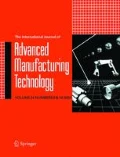Abstract
The efficiencies of supply chain management (SCM) are often impaired by inconsistent exchange and sharing of knowledge semantics among supply chain partners. To address this problem with semantic integration, this paper presents an approach to developing ontologies of supply chain management (Onto-SCM) as a common semantic model of the SCM domain. The Onto-SCM semantic model is constructed in a modular way in order to enhance its reusability and maintainability. The IDEF5 schematic language is employed to provide the graphical representation of Onto-SCM for intuitive communication between domain experts and users. Furthermore, Ontolingua is adopted to define formal semantics of Onto-SCM for effective knowledge interoperability. In addition, a case study of a printer supply chain is illustrated to demonstrate the proposed approach to semantic integration for SCM. Finally, a prototype is developed to support visualized knowledge modeling of the case system using the IDEF5 schematic language and to implement consistent knowledge transformation among heterogeneous applications in the supply chain.
Similar content being viewed by others
References
Ulieru M, Cobazru M (2005) Building holonic supply chain management systems: an e-logistics application for the telephone manufacturing industry. IEEE Trans Ind Inform 1:18–30
Lin HK, Harding JA, Shahbaz M (2004) Manufacturing system engineering ontology for semantic interoperability across extended project teams. Int J Prod Res 42:5099–5118
Studer R, Benjamins VR, Fensel D (1998) Knowledge engineering: principles and methods. Data Knowl Eng 25:161–197
Pinto HS, Martins JP (2004) Ontologies: How can they be built? Knowl Inform Syst 6:441–464
Benslimane D, Leclercq E, Savonnet M, Terrasse M-N, Yétongnon K (2000) On the definition of generic multi-layered ontologies for urban applications. Comput Environ Urban Syst 24:191–214
Grüninger M (2004) Ontology of the process specification language. In: Staab S, Studer R (eds) Handbook on ontologies. Springer, Berlin Heidelberg New York, pp 575–592
Fox MS, Gruninger M (1998) Enterprise modeling. AI Mag 19:109–121
Uschold M, King M, Moralee S, Zorgios Y (1998) The enterprise ontology. Knowl Eng Rev 13:31–89
Blomqvist E, Levashova T, Öhgren A, Sandkuhl K, Smirnov A, Tarassov V (2005) Configuration of dynamic SME supply chains based on ontologies. In: Proceedings of the 2nd International Conference on Industrial Applications of Holonic and Multi-Agent Systems (HoloMAS), Copenhagen, Denmark, August 2005, pp 246–256
KBSI (1994) IDEF5 method report. Available at: http://www.idef.com/Downloads.htm
Genesereth MR, Fikes RE (1992) Knowledge interchange format version 3.0 reference manual. Available at: http://www.upv.es/sma/teoria/sma/kqml_kif/kif.pdf
Gruber TR (1992) Ontolingua: a mechanism to support portable ontologies. Available at: http://citeseer.ist.psu.edu/gruber92ontolingua.html
Gruber TR (1993) A translation approach to portable ontology specifications. Knowl Acq 5:199–220
Corcho O, Fernández-López M, Gómez-pérez A (2003) Methodologies, tools and languages for building ontologies. Where is their meeting point? Data Knowl Eng 46:41–64
Farquhar A, Fikes R, Rice J (1997) The Ontolingua server: a tool for collaborative ontology construction. Int J of Human-Computer Studies 46:707–727
Huang GQ, Lau JSK, Mak KL (2003) The impacts of sharing production information on supply chain dynamics: a review of the literature. Int J Prod Res 41:1483–1517
OAGi (2006) OAGIS 9.0. Open Applications Group, Incorporated (OAGi). Available at: http://www.openapplications.org/downloads/oagidownloads.htm
OASIS (2004) Universal Business Language (UBL) 1.0. OASIS UBL Technical Committee. Available at: http://docs.oasis-open.org/ubl/cd-UBL-1.0/
Author information
Authors and Affiliations
Corresponding author
Rights and permissions
About this article
Cite this article
Ye, Y., Yang, D., Jiang, Z. et al. Ontology-based semantic models for supply chain management. Int J Adv Manuf Technol 37, 1250–1260 (2008). https://doi.org/10.1007/s00170-007-1052-6
Received:
Accepted:
Published:
Issue Date:
DOI: https://doi.org/10.1007/s00170-007-1052-6




